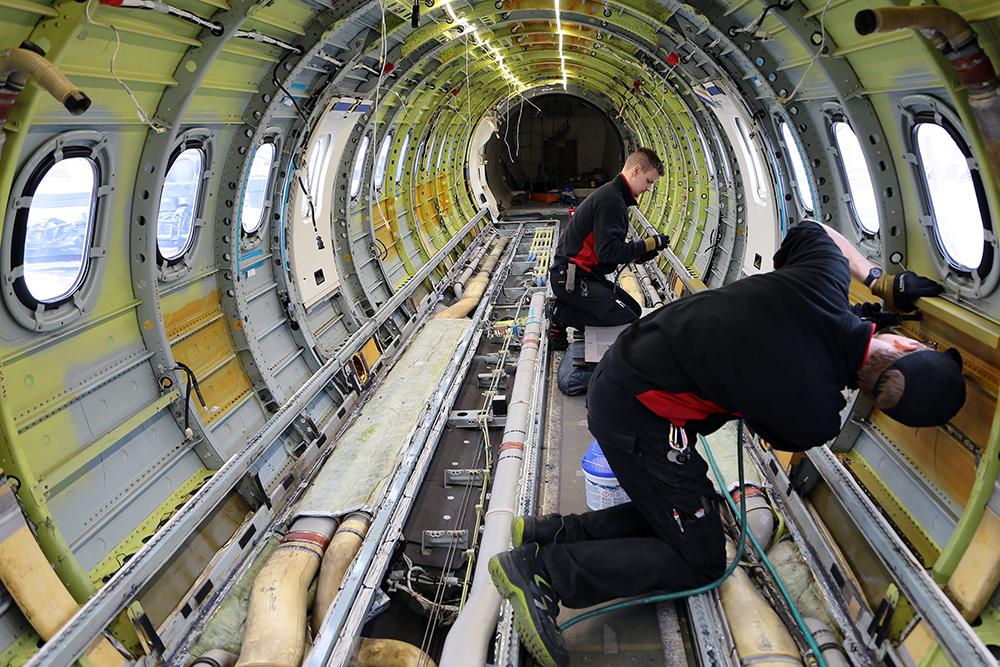
Growing cargo conversion demand is driving expansion of staff and facilities for Sweden’s Taby Air Maintenance (TAM). However, supply chain issues, workforce shortages and geopolitical factors are complicating its aftermarket business.
TAM had a very strong first half of 2022, according to Managing Director Pär Gulle, and has “high hopes for an equally good rest of the year.” Revenue figures will not be made public until end of the fiscal year, but TAM’s first-half revenue was up from the same period of 2021. “This is primarily due to the fact that we have the pandemic situation behind us, as well as a strong development in our cargo-conversion business,” Gulle adds.
A number of Saab 340 cargo conversions and TAM’s new Saab 2000 cargo conversion program are well under way, adding to a steady flow of ordinary maintenance work on Saabs and ATR 72s.
TAM also now has design organization approval and has brought part production in-house, which it says enables it to offer regional aircraft operators cost-effective maintenance and modifications, as well as deal with unexpected problems in hangars or AOGs on the ramp.
Offering both Saab 340 cargo conversions and the new Saab 2000 conversions, Gulle says TAM is now the global leader in Saab conversions. “In this year’s first six months, we exceeded our own expectations. Our Saab 340 cargo conversions continue to attract operators worldwide, and I am happy to see that we have more conversions in the pipeline in the next 12-18 months than I could have hoped for a year ago,” he says.
Roughly a third of TAM’s labor-hours are now related to cargo conversions, with the rest devoted to ordinary MRO.
Gulle says “the only clouds in the sky right now” are an urgent need for more skilled staff and additional floor space in workshops.
TAM has already recruited some aircraft mechanics and licensed engineers and it is intensifying its recruitment drive, working closely with aviation colleges in Sweden. However, these efforts will obtain basic trained mechanics. “We still have a need for additional experienced mechanics and technicians,” Gulle says. “We are also looking outside Sweden, and this has proven successful.”
To handle the floor-space challenge, TAM has rented a warehouse just outside Orebro Airport for storage of spare parts. “This will free up valuable hangar space,” Gulle notes. “Additionally, as a long- term solution, we are in talks with the airport in order to find a way of expanding our premises.”
TAM is not generally having challenges getting parts, but it is having problems with a few suppliers. Gulle says TAM is talking to these suppliers about possible remedies but evaluating alternative parts from other suppliers in the interim. For its cargo conversion program, TAM makes a long-term forecast and has stocked all the critical parts to avoid any delays in delivering converted freighters.
The war in Ukraine is not affecting TAM directly, since it no longer has any customers in the region. Indirectly, like the rest of aviation and industry, TAM is being hit by cost increases for transportation, heating and costs of living that will have long-term effects. “We will have a higher cost for heating our hangar during the upcoming winter,” says Gulle.
A possible European recession could also affect TAM’s business. However, Gulle says the impact would be less than in the past, as an increasing part of TAM’s business comes from North America. Unfortunately, a U.S. recession beginning in the final quarter of 2022 is also looking likely, but the demand for cargo conversions may not be dampened.




